Dawn Little's Blog, page 13
June 11, 2012
Big Plans by Bob Shea
Recommended Grades: 2nd -5th grades
In Big Plans a little boy sits in the corner of his classroom plotting his future and his plans are BIG! With the help of his bird and a lucky stinky hat, he may become Mayor, President, or fly to the moon!
I wrote a post about Big Plans in 2010. At that time, I recommended using it as a book to help students set goals for the beginning of the year. Here I recommend using it to set summer reading goals:
in 2010. At that time, I recommended using it as a book to help students set goals for the beginning of the year. Here I recommend using it to set summer reading goals:
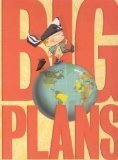 Lesson Plan Ideas:
Lesson Plan Ideas:
Goal Setting: After reading aloud Big Plans
 , discuss the idea of making summer reading goals with your students. As a class, discuss reasonable reading goals for the summer. Provide students with a Big Plans Summer Reading goal sheet they can use to record the number of books they read.
, discuss the idea of making summer reading goals with your students. As a class, discuss reasonable reading goals for the summer. Provide students with a Big Plans Summer Reading goal sheet they can use to record the number of books they read. Writers Workshop, Dialogue: Read aloud Big Plans
 and discuss how the author differentiated dialogue in the story (color and size). Share other models of dialogue for students as mentor texts when they are writing. Encourage students to borrow from the authors’ craft in their own writing.
and discuss how the author differentiated dialogue in the story (color and size). Share other models of dialogue for students as mentor texts when they are writing. Encourage students to borrow from the authors’ craft in their own writing. ©2012 by Dawn Little for Picture This! Teaching with Picture Books. All Amazon links are affiliate links and may result in my receiving a small commission. This is at no additional cost to you.
Filed under: Big Plans, dialogue, summer reading goals, teaching with picture books, writers workshop Tagged: Big Plans by Bob Shea, dialogue, summer reading goals, writers workshop








June 4, 2012
Chester by Melanie Watt
Recommended Grades: 2-5
Melanie Watt (author of the Scaredy Squirrel series) tried to write a mouse story, but Chester the cat just wouldn’t let her. What results is laugh out loud banter between the author and the character.
Lesson Idea:
Six Traits
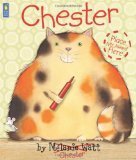

Voice: Read aloud Chester and discuss how the author’s voice comes alive in the crazy banter between her and the character. How does Melanie Watt make the story interesting, exciting and fun? What techniques does she use? Create a list of the techniques that make her voice interesting. Use other model texts to demonstrate voice as well.
and discuss how the author’s voice comes alive in the crazy banter between her and the character. How does Melanie Watt make the story interesting, exciting and fun? What techniques does she use? Create a list of the techniques that make her voice interesting. Use other model texts to demonstrate voice as well.
©2012 by Dawn Little for Picture This! Teaching with Picture Books. All Amazon links are affiliate links and may result in my receiving a small commission. This is at no additional cost to you.
Filed under: Chester by Melanie Watt, six traits of writing, voice Tagged: Chester by Melanie Watt, six traits of writing, voice








May 21, 2012
The Odd Egg by Emily Gravett
Recommended Grades: 4-6
All the birds have laid an egg, except Duck. Duck wants an egg, too. He comes upon a huge green spotted egg and makes it his own. All the other birds make fun of him, telling him it will never hatch and calling it an odd egg. When it finally does hatch, Duck (and all the other birds) are quite surprised!
Lesson Idea:
Six Traits
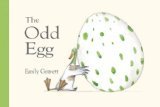

Organization, Surprise Ending: Read aloud The Odd Egg and have students predict what they think is in the egg prior to reading the ending. Read aloud the rest of the story and discuss whether student predictions were correct. How did the author surprise the reader with the ending? Share other books with surprise endings and use them as mentor texts when writing in writer’s workshop.
and have students predict what they think is in the egg prior to reading the ending. Read aloud the rest of the story and discuss whether student predictions were correct. How did the author surprise the reader with the ending? Share other books with surprise endings and use them as mentor texts when writing in writer’s workshop.
©2012 by Dawn Little for Picture This! Teaching with Picture Books. All Amazon links are affiliate links and may result in my receiving a small commission. This is at no additional cost to you.
Filed under: organization, six traits of writing, surprise endings, teaching with picture books, The Odd Egg Tagged: organization, six traits of writing, surprise endings, The Odd Egg








May 14, 2012
Extra Yarn by Mac Barnett
Published by: Harper Collins Children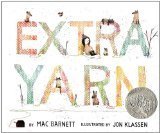

Date: January 17, 2012
Recommended Grades: 4-6
On a cold afternoon, in a cold little town, where everywhere you looked was either the white of snow or the black of soot from chimneys, Annabelle found a box filled with yarn of every color.
Using the yarn, Annabelle knits herself a sweater. When she has extra yarn, she begins to knit sweaters for other townspeople and even for things that don’t wear sweaters. When an archduke sails across the sea and offers to buy the yarn from Annabelle, she refuses. The archduke steals the box of yarn and sails back across the sea. What happens in the end is a surprise for all!
Lesson Idea:
Six Traits
Organization, Surprise Ending: Read aloud Extra Yarn to the point where the archduke sails away with the yarn. Stop and ask students to predict what they think will happen. Read aloud the rest of the story and discuss whether student predictions were correct. How did the author surprise the reader with the ending? Share other books with surprise endings and use them as mentor texts when writing in writer’s workshop.
to the point where the archduke sails away with the yarn. Stop and ask students to predict what they think will happen. Read aloud the rest of the story and discuss whether student predictions were correct. How did the author surprise the reader with the ending? Share other books with surprise endings and use them as mentor texts when writing in writer’s workshop.
Note: I received this book for review from the publisher.
©2012 by Dawn Little for Picture This! Teaching with Picture Books. All Amazon links are affiliate links and may result in my receiving a small commission. This is at no additional cost to you.
Filed under: Extra Yarn, six traits of writing, surprise endings, teaching with picture books, writers workshop Tagged: Extra Yarn by Mac Barnett, six traits of writing, surprise endings, writing workshop








May 7, 2012
Over and Under the Snow by Kate Messner
Recommended Grades: 3-5
“Over the snow I glide. Into woods, frosted fresh and white” begins Kate Messner’s latest picture book in which a mix of language and science brings the subnivean zone to life. What is the subnivean zone? It’s the space between the snowpack and the ground, where many animals live during the winter.
Lesson Idea:
Writer’s Workshop
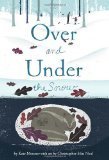

Six Traits of Writing/Ideas: Read aloud Over and Under the Snow and discuss how the author used several techniques to make beautiful language (alliteration, repetition, descriptive words/phrases, etc.). Discuss how student authors can mimic Messner’s craft and write their own pieces using alliteration, repetition or descriptive phrases. Have students try to use one of or a mixture of the craft techniques Messner uses in drafts of their own writing pieces.
and discuss how the author used several techniques to make beautiful language (alliteration, repetition, descriptive words/phrases, etc.). Discuss how student authors can mimic Messner’s craft and write their own pieces using alliteration, repetition or descriptive phrases. Have students try to use one of or a mixture of the craft techniques Messner uses in drafts of their own writing pieces.
©2012 by Dawn Little for Picture This! Teaching with Picture Books. All Amazon links are affiliate links and may result in my receiving a small commission. This is at no additional cost to you.
Filed under: Over and Under the Snow by Kate Messner, six traits of writing, teaching with picture books, word choice, writers workshop Tagged: Over and Under the Snow by Kate Messner, six traits of writing, word choice








April 30, 2012
The Mysteries of Harris Burdick by Chris Van Allsburg
Recommended Grades: 2-6
In the introduction, we learn that Chris Van Allsburg saw the drawings in this book at the home of Peter Wenders. Wenders once worked for a children’s book publisher. Thirty years ago, a man called Mr. Wender’s office, introducing himself as Harris Burdick and leaving 14 drawings with a title and caption for each one. Burdick promised to return the next day with the stories he had written to go with each picture. Mr. Burdick was never heard from again. . .
Lesson Idea:
Comprehension Strategies:
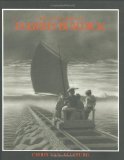

Making Inferences: Read aloud The Mysteries of Harris Burdick as part of a unit on making inferences. Provide students with a picture and ask them to infer what is happening in the picture. Use this book after modeling and making inferences with other books.
as part of a unit on making inferences. Provide students with a picture and ask them to infer what is happening in the picture. Use this book after modeling and making inferences with other books.
Six Traits
Idea Development: After reading aloud The Mysteries of Harris Burdick , have students choose a picture from the book and using the first line that is written, continue the story. How do they envision the story?
, have students choose a picture from the book and using the first line that is written, continue the story. How do they envision the story?
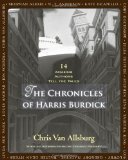

Note: Recently many popular children’s authors came together and wrote stories based on these pictures in The Chronicles of Harris Burdick: Fourteen Amazing Authors Tell the Tales / With an Introduction by Lemony Snicket . After students write their own stories based on the pictures, share some of the author’s ideas and how they envisioned the story.
. After students write their own stories based on the pictures, share some of the author’s ideas and how they envisioned the story.
©2012 by Dawn Little for Picture This! Teaching with Picture Books. All Amazon links are affiliate links and may result in my receiving a small commission. This is at no additional cost to you.
Filed under: comprehension strategies, ideas, making inferences, six traits of writing, teaching with picture books, The Mysteries of Harris Burdick by Chris Van Allsburg, writers workshop Tagged: comprehension strategies, making inferences, six traits of writing, The Mysteries of Harris Burdick, writers workshop








April 23, 2012
Alexander, Who Used to Be Rich Last Sunday by Judith Viorst
Recommended Grades: 3-5
Alexander receives money from his grandparents and really wants to keep it, but does he?
Lesson Idea:
Reading Workshop
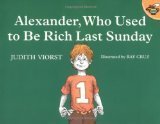

Comprehension Strategies: Making Inferences: Read aloud Alexander, Who Used to Be Rich Last Sunday and model how to infer what characters are feeling based on the pictures and text. Create a t-chart that says Text Clues and Inference and use it as a guide to scaffold for students (or What the Picture Shows/Inference). Once you’ve modeled, provide students the opportunity to make inferences with a partner (use a different book) using the t-chart. Eventually, have students make inferences as they read without the t-chart.
and model how to infer what characters are feeling based on the pictures and text. Create a t-chart that says Text Clues and Inference and use it as a guide to scaffold for students (or What the Picture Shows/Inference). Once you’ve modeled, provide students the opportunity to make inferences with a partner (use a different book) using the t-chart. Eventually, have students make inferences as they read without the t-chart.
©2012 by Dawn Little for Picture This! Teaching with Picture Books. All Amazon links are affiliate links and may result in my receiving a small commission. This is at no additional cost to you.
Filed under: Alexander Who Used to Be Rich Last Sunday, comprehension strategies, making inferences, teaching with picture books Tagged: Alexander Who Used to Be Rich Last Sunday, making inferences, reading comprehension strategies, teaching with picture books








April 16, 2012
Balloons Over Broadway by Melissa Sweet
Recommended Grades: 3-5
A picture book based on the true story of Tony Sarg, the man behind the Macy’s Thanksgiving Day parade.
Lesson Idea:
Writers Workshop


Organization: Read aloud Balloons over Broadway: The True Story of the Puppeteer of Macy’s Parade and discuss how the author organized this picture book. The information about Tony Sarg is written around his involvement in and design of the Macy’s Thanksgiving Day Parade. Use Balloons over Broadway: The True Story of the Puppeteer of Macy’s Parade
and discuss how the author organized this picture book. The information about Tony Sarg is written around his involvement in and design of the Macy’s Thanksgiving Day Parade. Use Balloons over Broadway: The True Story of the Puppeteer of Macy’s Parade , as well as other picture book biographies, as a model. Then, ask students to write a biographical piece based on a special event in our country.
, as well as other picture book biographies, as a model. Then, ask students to write a biographical piece based on a special event in our country.
©2012 by Dawn Little for Picture This! Teaching with Picture Books. All Amazon links are affiliate links and may result in my receiving a small commission. This is at no additional cost to you.
Filed under: Balloons Over Broadway by Melissa Sweet, biographies, organization, six traits of writing, teaching with picture books, writers workshop Tagged: Balloons Over Broadway, organization, picture book biographies, six traits of writing, writers workshop








April 9, 2012
The Adventures of Mark Twain by Huckleberry Finn by Robert Burleigh
Recommended Grades: 3-5
A picture book about the life of Mark Twain, written in the voice of his well known character, Huckleberry Finn.
I have come across several wonderful picture book biographies lately. See last week's post for one on Jane Goodall. Next week, I will share another.
Lesson Idea:
Writers Workshop
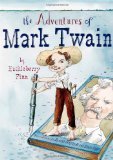

Organization: Read aloud The Adventures of Mark Twain by Huckleberry Finn and discuss how the author organized this picture book. The book is written from the view point of the subject's character. The author paid particular attention to the use of language and kept true to the character and provided an editor's note explaining why the particular dialect was used. Use The Adventures of Mark Twain by Huckleberry Finn
and discuss how the author organized this picture book. The book is written from the view point of the subject's character. The author paid particular attention to the use of language and kept true to the character and provided an editor's note explaining why the particular dialect was used. Use The Adventures of Mark Twain by Huckleberry Finn , as well as other picture book biographies, as a model. Then, ask students to use a character from a favorite book and write a picture book about the author from the character's point of view.
, as well as other picture book biographies, as a model. Then, ask students to use a character from a favorite book and write a picture book about the author from the character's point of view.
©2012 by Dawn Little for Picture This! Teaching with Picture Books. All Amazon links are affiliate links and may result in my receiving a small commission. This is at no additional cost to you.
Filed under: biographies, organization, six traits of writing, teaching with picture books, The Adventures of Mark Twain by Huckleberry Finn, writers workshop Tagged: organization, picture book biographies, six traits of writing, The Adventures of Mark Twain by Huckleberry Finn, writers workshop








April 2, 2012
Me. . . Jane by Patrick McDonnell
Recommended Grades: 3-5
A picture book based on the life of Jane Goodall.
Lesson Idea:
Writers Workshop
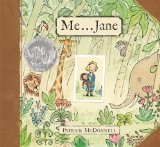

Six Traits of Writing: Organization: Read aloud Me . . . Jane and discuss how the author took a real person and real events from her life and organized them into a picture book. Use Me . . . Jane
and discuss how the author took a real person and real events from her life and organized them into a picture book. Use Me . . . Jane , as well as other picture book biographies, as a model. Then, ask students to research one aspect of a person's life and write a picture book about that person.
, as well as other picture book biographies, as a model. Then, ask students to research one aspect of a person's life and write a picture book about that person.
©2012 by Dawn Little for Picture This! Teaching with Picture Books. All Amazon links are affiliate links and may result in my receiving a small commission. This is at no additional cost to you.
Filed under: biographies, Me. . . Jane, organization, six traits of writing, writers workshop Tagged: Me. . . Jane, organization, six traits of writing, writers workshop











